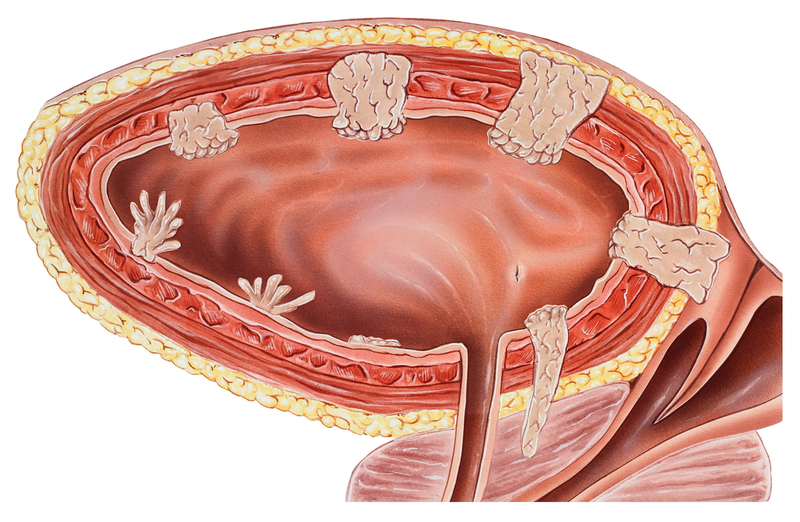Novel targeted-antibody treatment produced responses in nearly half of patients with advanced urothelial cancer
2019 ASCO Annual Meeting News Release Jun 06, 2019
A single arm, phase II clinical trial of 125 patients showed treatment with enfortumab vedotin (EV) – a new agent targeting Nectin-4, a protein found in 97% of urothelial cancers – produced responses in 44% of patients with locally advanced or metastatic forms of urothelial cancer. Patients had previously been treated with platinum chemotherapy and a PD-1 or PD-L1 immune checkpoint inhibitor, but the cancer had progressed despite these treatments.

ASCO Perspective
“If advanced urothelial cancer progresses following treatment with platinum-based chemotherapy and immunotherapy with checkpoint inhibitors there are no FDA approved treatment options. Although this is a small, phase II trial, the anti-tumor activity demonstrated in patients whose disease progressed on chemotherapy and immunotherapy is promising, we await larger studies to confirm these early findings.” said ASCO Expert Robert Dreicer, MD, MS, MACP, FASCO.
The study was featured in a press briefing 4th June and presented at the 2019 American Society of Clinical Oncology (ASCO) Annual Meeting.
“These phase II results replicate the phase I results very closely, which is not often the case in clinical trials,” said lead study author Daniel P. Petrylak, MD, a Professor of Medicine (Medical Oncology) and Urology at Yale Cancer Center, New Haven, CT. “The fact that we have a therapy that can help people who don’t benefit from checkpoint inhibitors is very gratifying.”
Urothelial cancer includes cancer of the bladder (90% of cases), the urethra, ureters, renal pelvis, and a few other adjacent organs. Urothelial cancers occur more frequently in men in the United States. In 2019, there will be an estimated 80,470 new cases of bladder cancer (61,700 men and 18,770 women) in the United States, with 17,670 deaths (12,870 men and 4,800 women).
After a locally advanced or metastatic urothelial cancer diagnosis, patients are usually treated first with platinum-based chemotherapy. If their disease progresses, second-line therapy is a checkpoint inhibitor, an immunotherapy that works to modulate immune responses, thereby allowing T cells to attack cancer cells. There are five checkpoint inhibitors approved for use in urothelial cancer: pembrolizumab (Keytruda), atezolizumab (Tecentriq), durvalumab (Imfinzi), nivolumab (Opdivo), and avelumab (Bavencio). However, cancer progresses in 75-80% of people with advanced urothelial cancer who receive an immune checkpoint inhibitor. There is no remaining approved standard of care treatment option for this cancer if it progresses after immunotherapy has been used.
About the Study
Phase I trial results of EV provided sufficient evidence that it was safe to administer. In March 2018, the U.S. Food and Drug Administration granted it a breakthrough therapy designation for people with locally advanced or metastatic urothelial cancer that has progressed during or following checkpoint inhibitor therapy.
For phase II, investigators enrolled urothelial patients who had been treated with platinum-based chemotherapy and/or checkpoint inhibitors to two groups: group one had been previously treated with both medicines, and group two consisted of people who had not received platinum chemotherapy. Only results from the first group are currently being reported.
In group one, 70% of enrollees were male and the median age was 69; 35% of people had cancers in their upper urinary tract, a relatively uncommon site; and enrollees had a median of three prior systemic treatments in the locally advanced or metastatic setting but had not received treatment for at least two weeks prior to enrolling in this trial.
Key Findings
Forty-four percent of people responded to EV resulting in either no growth or shrinkage in their tumors, and 12% had a complete response with no detectable sign of cancer. The median overall survival time was 11.7 months.
Among those patients with cancer that had not responded to a checkpoint inhibitor, 41% responded to EV, and 38% of people with cancer that had metastasized to the liver responded to EV.
EV was well-tolerated among patients enrolled in the trial. The most common side effects included fatigue (50%), alopecia -- or hair loss (49%) -- and decreased appetite (44%).
Next Steps
A phase III study to confirm these findings is now underway. Group two is still enrolling people in the trial, and there is also a trial in progress to look at the benefits of providing EV for people newly diagnosed with advanced urothelial cancer. The trial is studying EV in combination with pembrolizumab, and EV in combination with a platinum-based chemotherapy.
This study received funding from Seattle Genetics and Astellas Pharma.
This article is a news release from 2019 ASCO Annual Meeting. Read the original here.
-
Exclusive Write-ups & Webinars by KOLs
-
Daily Quiz by specialty
-
Paid Market Research Surveys
-
Case discussions, News & Journals' summaries